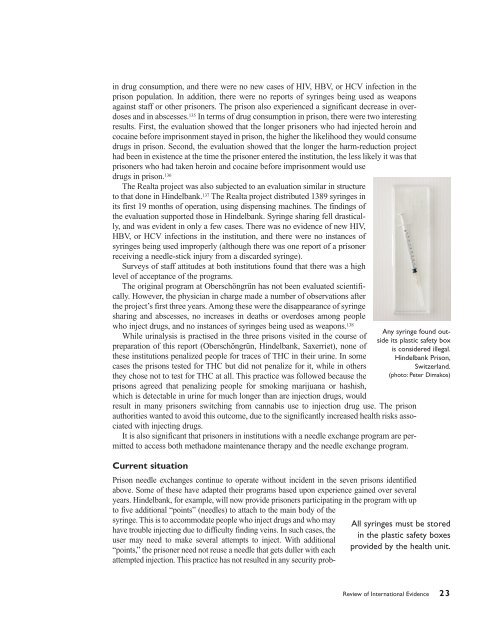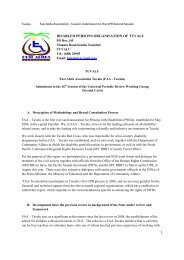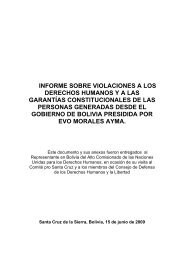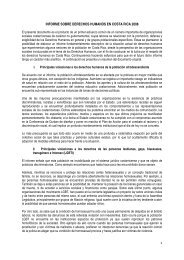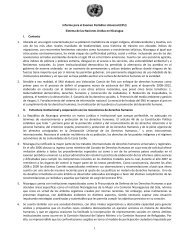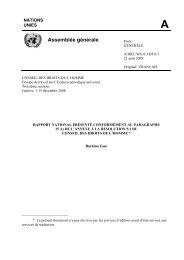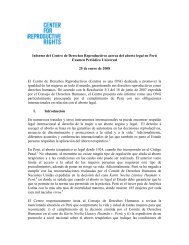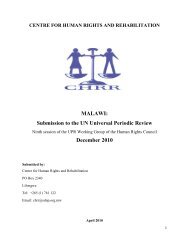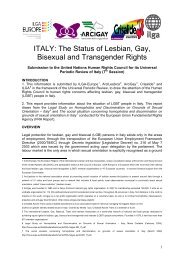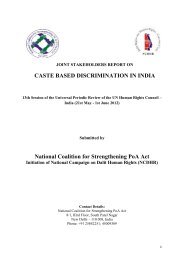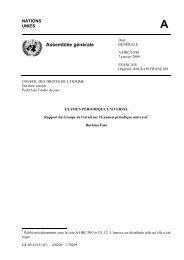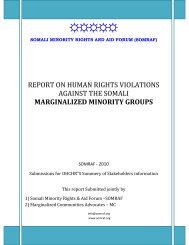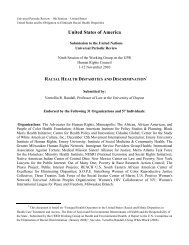Prison Needle Exchange: Lessons from a Comprehensive Review ...
Prison Needle Exchange: Lessons from a Comprehensive Review ...
Prison Needle Exchange: Lessons from a Comprehensive Review ...
Create successful ePaper yourself
Turn your PDF publications into a flip-book with our unique Google optimized e-Paper software.
in drug consumption, and there were no new cases of HIV, HBV, or HCV infection in the<br />
prison population. In addition, there were no reports of syringes being used as weapons<br />
against staff or other prisoners. The prison also experienced a significant decrease in overdoses<br />
and in abscesses. 135 In terms of drug consumption in prison, there were two interesting<br />
results. First, the evaluation showed that the longer prisoners who had injected heroin and<br />
cocaine before imprisonment stayed in prison, the higher the likelihood they would consume<br />
drugs in prison. Second, the evaluation showed that the longer the harm-reduction project<br />
had been in existence at the time the prisoner entered the institution, the less likely it was that<br />
prisoners who had taken heroin and cocaine before imprisonment would use<br />
drugs in prison. 136<br />
The Realta project was also subjected to an evaluation similar in structure<br />
to that done in Hindelbank. 137 The Realta project distributed 1389 syringes in<br />
its first 19 months of operation, using dispensing machines. The findings of<br />
the evaluation supported those in Hindelbank. Syringe sharing fell drastically,<br />
and was evident in only a few cases. There was no evidence of new HIV,<br />
HBV, or HCV infections in the institution, and there were no instances of<br />
syringes being used improperly (although there was one report of a prisoner<br />
receiving a needle-stick injury <strong>from</strong> a discarded syringe).<br />
Surveys of staff attitudes at both institutions found that there was a high<br />
level of acceptance of the programs.<br />
The original program at Oberschöngrün has not been evaluated scientifically.<br />
However, the physician in charge made a number of observations after<br />
the project’s first three years. Among these were the disappearance of syringe<br />
sharing and abscesses, no increases in deaths or overdoses among people<br />
who inject drugs, and no instances of syringes being used as weapons. 138<br />
While urinalysis is practised in the three prisons visited in the course of<br />
preparation of this report (Oberschöngrün, Hindelbank, Saxerriet), none of<br />
these institutions penalized people for traces of THC in their urine. In some<br />
cases the prisons tested for THC but did not penalize for it, while in others<br />
they chose not to test for THC at all. This practice was followed because the<br />
prisons agreed that penalizing people for smoking marijuana or hashish,<br />
which is detectable in urine for much longer than are injection drugs, would<br />
result in many prisoners switching <strong>from</strong> cannabis use to injection drug use. The prison<br />
authorities wanted to avoid this outcome, due to the significantly increased health risks associated<br />
with injecting drugs.<br />
It is also significant that prisoners in institutions with a needle exchange program are permitted<br />
to access both methadone maintenance therapy and the needle exchange program.<br />
Current situation<br />
<strong>Prison</strong> needle exchanges continue to operate without incident in the seven prisons identified<br />
above. Some of these have adapted their programs based upon experience gained over several<br />
years. Hindelbank, for example, will now provide prisoners participating in the program with up<br />
to five additional “points” (needles) to attach to the main body of the<br />
syringe. This is to accommodate people who inject drugs and who may<br />
have trouble injecting due to difficulty finding veins. In such cases, the<br />
user may need to make several attempts to inject. With additional<br />
“points,” the prisoner need not reuse a needle that gets duller with each<br />
attempted injection. This practice has not resulted in any security prob-<br />
Any syringe found outside<br />
its plastic safety box<br />
is considered illegal.<br />
Hindelbank <strong>Prison</strong>,<br />
Switzerland.<br />
(photo: Peter Dimakos)<br />
All syringes must be stored<br />
in the plastic safety boxes<br />
provided by the health unit.<br />
<strong>Review</strong> of International Evidence 23


